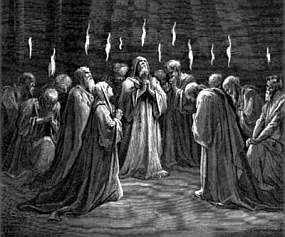In his book Reimagining Church, Frank Viola poses a few questions that should unnerve us. I’ve asked similar questions here, but I think revisiting at least one is worthwhile:
If the Holy Spirit were to depart, what aspects of our Sunday church meeting would be changed by His absence?
Unfortunately, I suspect the answer for most churches would be Not a darned thing. Our worship, prayers, liturgies, sermons, and even our greetings could go on and on without anyone noticing the Holy Spirit had left the building.
Why? Because almost nothing of the way we practice the faith in our meetings relies on the presence of the Holy Spirit.
We can sing songs without the Holy Spirit.
We can recite lines of liturgy without the Holy Spirit.
We can talk with others about life without the Holy Spirit.
We can prepare sermons without the Holy Spirit.
We can listen to those Spirit-less sermons without the Holy Spirit.
We can offer prayers without the Holy Spirit.
We can partake of a thimble of grape juice and a tiny cracker without the Holy Spirit.
We can run through our optimized order of service without the Holy Spirit.
We can perform dozens of church-related rituals without the Holy Spirit. Truth is, every Sunday in America, thousands of churches go through these motions and could keep going through them without noticing any difference if the Holy Spirit departed.
We are on auto-pilot in our churches. We have them programmed and timed down to the smallest letter and to the last minute. We don’t need the Holy Spirit at all.
Problem is, that’s not the Church of the Bible.
The church assembly of the Bible was led by the Spirit from beginning to end. It depended in the Spirit for everything. Without the Holy Spirit, the charismatic gifts would cease to function.  There would be no prophetic words possible. No words of knowledge or wisdom. No healing. None of the functions of a normal assembly of Christian people filled by the Spirit coming together to share their individual giftings in a public setting.
There would be no prophetic words possible. No words of knowledge or wisdom. No healing. None of the functions of a normal assembly of Christian people filled by the Spirit coming together to share their individual giftings in a public setting.
The order of the church would vanish without the Holy Spirit. What would those assembled do next? No one would have a psalm or spiritual song to bring because the Holy Spirit would not be there to inspire its singing or bringing. What inspired-in-the-moment message would be possible? Who would lead?
The people in the church assembly, those equipped by the Spirit to use their gifts, would have nothing to do, their reliance on the Spirit shattered by His absence. They would sit passively, lost.
A real church without the presence of the Holy Spirit to guide, equip, use, and mobilize would cease completely to be what it is supposed to be as depicted in the Bible.
From all this, the only conclusion that we can make is that most churches in America, because they would not cease to function the moment the Spirit departed, are simply not real churches. They have become a sort of theatrical performance with a bit of group participation thrown in—and a tiny fraction of participation at that.
This should alarm us, shouldn’t it?
I have written previously that the one key aspect of the Christian Church that separates it from all other religious bodies is the Holy Spirit indwelling believers in the assembly, the infinite God of the Universe making Himself at home within the faithful follower. Other religions have sacred books, theologies, and practices, some of which mirror those of Christianity, but none can be said to include the Holy Spirit of God indwelling. That indwelling makes the Christian unique and gives the Church its raison d’être. No wonder that most pseudo-Christian cults mangle or do away with a theology of the Holy Spirit.
If your church could continue to do what it does each Sunday morning should the Spirit depart, then it is not a genuine church.
Something to consider the next time you sit in the pew on Sunday and wonder what is missing.


 lost people to come to our church meetings has only succeeded in diluting our ultimate effectiveness. As it is said: The good is often the enemy of the best.
lost people to come to our church meetings has only succeeded in diluting our ultimate effectiveness. As it is said: The good is often the enemy of the best.